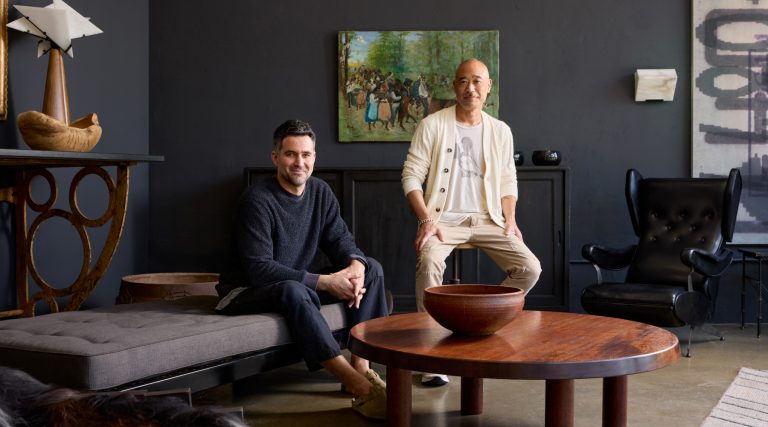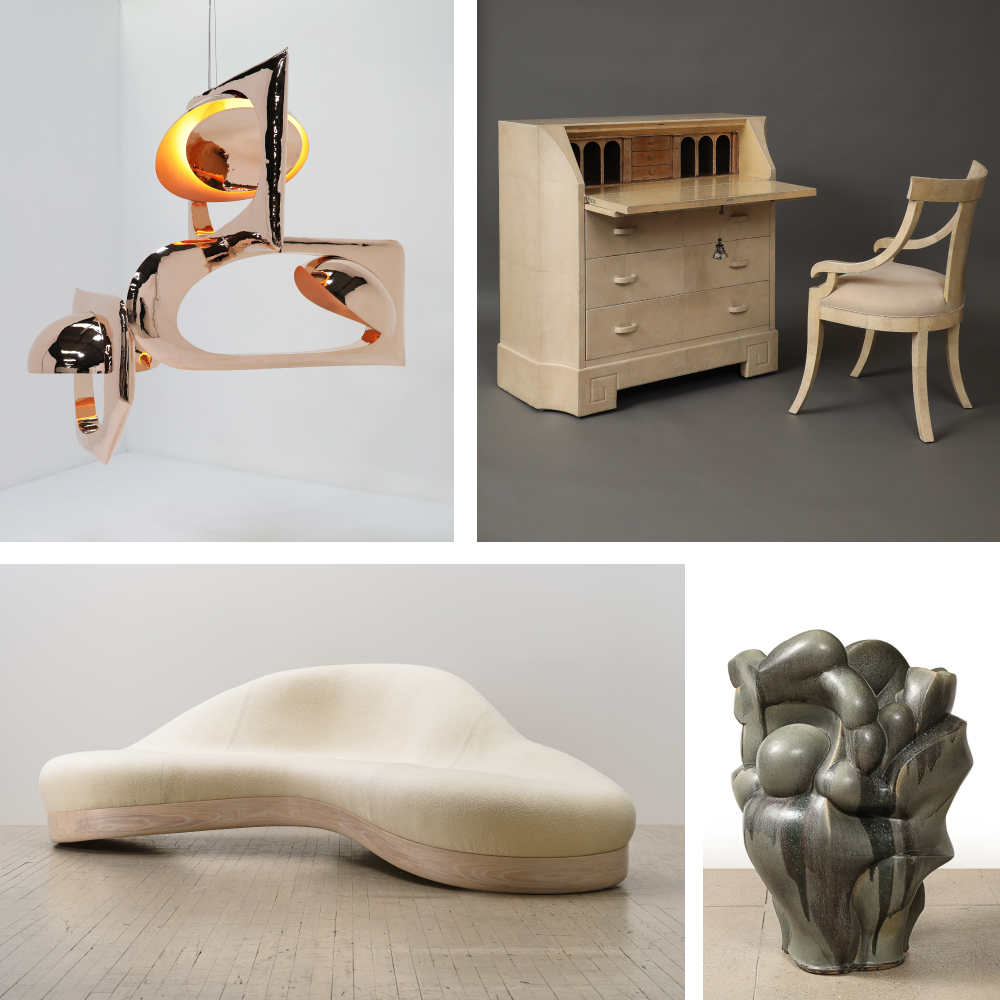April 13, 2025Certain New York events — like Fashion Week, Shakespeare in the Park and the New York City marathon — aren’t just annual happenings; they’re part of the culture. For the design community, the same might be said of Design on a Dime (DOAD), the furniture and home-decor shopping extravaganza held each spring to benefit people living with HIV/AIDS, as well as other New Yorkers in need.
The retail ritual, which many interior designers as well as nonprofessionals look forward to all year, is coordinated by Housing Works, a nonprofit dedicated to ending AIDS and homelessness and addressing a host of related issues. Started in 1990, its mission has grown to providing housing, healthcare, vocational training and legal services.

To fund these activities, Housing Works runs several businesses, including a bookstore/café and cannabis dispensaries. It’s probably best known, however, for its thrift shops, of which there are currently nine throughout the city. They are beloved not only by locals but also by interior designers, who, like true New Yorkers, scour them year-round for everyday deals and once-in-a-lifetime finds.
The latest edition of Design on a Dime, taking place April 23 through 26 at the Metropolitan Pavilion, in Manhattan’s Chelsea neighborhood, marks the event’s 20th anniversary. Although it is now a can’t-miss for design enthusiasts and bargain hunters, designer and event founder James “Ford” Huniford says he could never have predicted the fundraiser’s success when he launched it two decades ago. “I had no idea what Design on a Dime would become,” he recalls. “When I started this, people were dying left and right, and AIDS was affecting so many different people in so many different communities. I thought it was important to try to find a way to make a difference for people.”

And what a difference DOAD has made. To date, it has raised more than $24 million.
This year’s four-day affair will kick off April 23 with the 20th Anniversary Celebration dinner and awards ceremony. The 2025 honorees include journalist Tamron Hall; interior designers Alessandra Branca, Nate Berkus and Jeremiah Brent; and retailer Bloomingdale’s. Ticketed early-access shopping will take place April 24, followed by two free public sale days.

As always, the event will feature shoppable booths curated by a who’s who of top interior designers working with items donated by vendors, as well as pieces from their personal inventory. Art, furniture and other decor used in the vignettes are priced with discounts of up to 80 percent.
Huniford notes that past editions have included pieces with remarkable provenance. “I remember, years ago, Robert Stilin had an André Arbus sideboard in his vignette that was probably worth twenty-five thousand dollars — it was just unreal,” he says. “And then, Cliff Fong had a light fixture that I think was in Diane Keaton’s house.”


That said, the objects and displays are only part of the story. “It’s not about who’s going to design the best room or who’s going to get the most expensive chandelier to use,” says Huniford. “It’s all about commitment, creativity and community.”
To celebrate this extraordinary milestone, we’ve asked a few of this year’s participants to tell us what Design on a Dime means to them and show us how they’ve used some of their best finds, sourced from the event or from Housing Works’ treasure-filled thrift shops.
De la Torre Design Studio

WHY: Ernest de la Torre has been a part of Design on a Dime since its inception. “I’ve been working with Housing Works for twenty years on this program,” he says. “It’s wonderful to see the design community come together and create something beautiful that people appreciate and that has such a bountiful outcome.”

HIS FIND: When the designer came across two parchment console tables in the style of Jean-Michael Frank at a Housing Works thrift shop, he used them in the Georgian-style entrance of his own former home in Snedens Landing, New York. In front of each he set an elegant Carol Egan stool from Maison Gerard.
At the far end of the airy space was a regal chair designed by Armand-Albert Rateau for George Blumenthal, president of the Metropolitan Museum of Art in the 1930s. This stood opposite an Art Nouveau Vallauris majolica planter by Jerome Massier.
De la Torre filled the space with other wonderfully personal elements. “I had the lighting fixtures custom made in Milan, as the theme in the house was dragonflies, a symbol of longevity,” he says. On the walls, he placed silhouette portraits of himself and his spouse by artist duo McDermott & McGough.
Timothy Brown Studio

WHY: Timothy Brown cites his faith in Design on a Dime’s founder and team as the reason for his dedication to the charity. “Sometimes, you may donate money or something else to an organization, and it may or may not make it to where it’s supposed to go,” he says. “But I feel that, with Ford and all the other people that are involved with this event, it really does help the community, and I think it’s a great thing.”

HIS FIND: When one of Brown’s most loyal clients moved to an apartment on Park Avenue, the designer was tasked with a full makeover of the home. “She’s this cool lady who said she never thought she wanted to live on Park Avenue,” he recalls. “But she said if she was going to live on Park Avenue, she wanted it to feel like a loft.”
With that in mind, Brown turned the entryway right off the elevator into a “cool, slick, minimal space,” using a wooden chair purchased from Neal Beckstedt’s tableau at Design on a Dime. “It’s sort of based on the whole Donald Judd minimalist furniture style, and it just seemed to fit perfectly in this foyer.”
To create a gallery feel, Brown kept the objects to a minimum. He hung a three-dimensional clay work by Takashi Murakami in the entrance and continued the vibe with a set of photographs by Ryan McGinley in the connecting hallway.
Foley & Cox


WHY: This year Michael Cox and Zuni Madera, of Foley & Cox, will mark their “Sweet 16” as DOAD participants. They’re pretty chuffed about the anniversary and to be supporting what Cox calls “a phenomenal organization.”
“Design on a Dime rallies our interior-design community and brings together vendors, galleries, artisans and clients to contribute to one of the best shopping events of the year!” says Cox. “Zuni and I are proud to have participated for so long.”

THEIR FIND: The pair made a Design on a Dime purchase the star of what Cox calls the “first-impression entryway” of a classic shingle-style home in the Hamptons. “We were thrilled to acquire the vase on the center table at Design on a Dime. It’s from the acclaimed ceramicist Peter Lane and creates a magnificent focal point in this open space.”
It was a strategic choice, the designer explains. “We wanted to immediately convey a strong sense of welcome, hospitality and arrival. And we thought having this sculptural vase in which to display seasonal flowers and branches perfectly reflected that sensibility.”
And the other pieces? “An eclectic mix of modern, vintage and custom contributes to the ‘collected’ vibe of the house,” says Cox, noting the wooden pedestal from the firm’s Hudson Valley store, foley&cox HOME; a hall table found at the Saint-Ouen flea market, in Paris; and a chest of drawers they designed when the client asked for something inspired by Mondrian.
JDK Interiors

WHY: For Jenny Dina Kirschner, seeing is believing. She witnessed firsthand the good that Housing Works does when she visited the organization’s Keith D. Cylar Community Center, on New York’s Lower East Side.
“I was there many years ago,” she recalls. “And I was just so impressed with the kind of care they offer and how dedicated and devoted they are to the individuals they service. They have wonderful facilities for rehab, they have art therapy, they have a real community within this facility.”
She also loves the rush of adrenaline DOAD offers. “There’s a VIP hour, and you get to look through all these vignettes before they’re open for shopping. They put up these ropes in front of them, and then, they count down as everyone stands at the vignettes. They drop the ropes, and it’s like Supermarket Sweep!”

HER FIND: Kirschner says she tries to participate in DOAD every few years, both as a vignette designer and a shopper. “It’s super fun,” she says, “and you find such deals.” In fact, she didn’t even realize what a score she’d made one year until long after the event.
“I bought a silver catchall from the Redd Kahoi vignette, and I brought it home and put it out on my coffee table,” she recounts. “Many months later, I noticed it started to turn a bit yellowish.” Kirschner turned the piece over for the first time and made two discoveries. “Not only was it sterling silver, it was Christian Dior! I think it was fifty dollars. That was like the bargain of the century. I was so blown away.”
Apartment 48

WHY: Rayman Boozer, of Apartment 48, is one of this year’s DOAD cochairs. He has unequivocal admiration for Housing Works. “This is my favorite charity,” he says. “I was personally affected by the AIDS crisis. I lost some family and friends. When I learned about Housing Works and the work that they do, I really wanted to take part.”

HIS FIND: “I think Design on a Dime is a great resource for unexpected items,” says Boozer. One year, he spotted a Royal typewriter from the 1930s. “I was looking for a vintage typewriter, and they seem quite rare. When I came across this one, I had to get it.”
Boozer used it as the finishing touch for the primary bedroom of a summer home in Sag Harbor, New York. “The space was partially inspired by a writer’s room, so a typewriter fit perfectly.”
As for the overall vibe, the name of the game was tranquility. “It’s a very relaxed vacation atmosphere, with natural materials such as a grasscloth wallcovering and a rattan desk.” Boozer paired the desk with a vintage chair and added lighting from Visual Comfort.
Huniford

WHY: “It’s all about community and the design world and designers all joining together to make a difference in other people’s lives,” says the DOAD founder. “I couldn’t be more grateful.”

HIS FINDS: When Huniford noticed three factory molds at a Housing Works thrift shop, he decided to use them as an art piece in the kitchen of a home he was designing in Bridgehampton, New York. Another Housing Works find — an ironstone crock — was employed as a vase on the kitchen table. “I decided to have a large table in the middle of the kitchen instead of an island so it’s more relaxed and flexible for casual dining,” he explains. It was a choice that was authentic to the character of the home. “The original part of the house was built in 1865.”
He flanked the rustic table with a set of French industrial chairs covered in a white linen from Schumacher and placed an American wing chair just off the kitchen.
Huniford notes that DOAD doesn’t just offer great bargain hunting; it also offers the chance to make memories. “Every designer has a story or a memory about Design on a Dime,” he says. “For me, that’s part of what it’s all about.”







